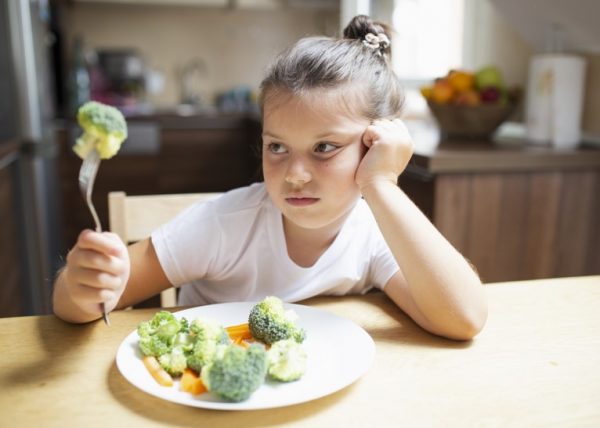
Is your child suffering from Anorexia
When children and teens start feeling that they weigh too much and also subjected to body shaming they may develop anorexia, subjecting themselves self- starvation. Anorexia or Anorexia nervosa is an eating disorder. Children who suffer from anorexia will have distorted body image.
Two types of anorexia in children-
Restrictor type: Children severely limit how much amount of food they eat.
Bulimic type: They eat too much food and make themselves throw up.
Apart from body shaming and bullying, other reasons that may play a role in developing anorexia are;
- Social attitudes toward body appearance
- Family influences
- Genetics
- Brain chemical imbalances
- Developmental issues
Family history such as: Weight problems, Physical illness and mental health problems, such as depression or substance abuse also could be reasons for anorexia.
Symptoms:
- Low body weight.
- Child often has a distorted view of his or her body.
- Physical symptoms may include very dry skin, belly pain, and constipation.
- Dry skin that when pinched and let go, stays pinched
- Fluid loss (dehydration)
- Belly pain
- Constipation
- Lethargy
- Dizziness
- Extreme tiredness (fatigue)
- Sensitivity to cold temperatures
- Being abnormally thin (emaciated)
- Growth of fine, downy body hair (lanugo)
- Yellowing of the skin
What are the possible complications of anorexia nervosa in a child?
Anorexia and the malnutrition that results can harm nearly every organ system in the body. It can be fatal. It may lead to health problems with the:
- Heart : Damage to heart due to malnutrition and repeated vomiting, irregular heart beat, low BP
- Blood: Mild anemia and low WBC
- Digestive system: Movement of digestive tract slows down
- Kidney: Concentrated urine due to dehydration.
- Endocrine system: In young girls, lower level of growth hormones and lack of menstrual periods
- Bones: Greater risk of bone fracture, less bone density
- Muscle: Less muscle and looks thin
Talk to your family physician and understand what is going on with your child’s health. Do not neglect child’s health thinking it is a passing stage. Identifying and treating anorexia at early stages helps to get back child’s normal weight and development. Based on diagnosis doctor may recommend,
- Individual therapy
- Family therapy
- Behavior changes
- Nutritional rehabilitation
- Antidepressant medicines, if your child is also depressed
How parents and family can help?
- Treatments helps to improve child’s quality of life. Encourage your children to eat healthy and be realistic towards weight. Help them with a diet plan to maintain balanced weight.
- Do not skip any appointments with doctor and accompany your child in his/her doctor’s visit.
- Discuss with your friends and close ones about your child’s anorexia.
- Talk to healthcare provider and school teachers to develop a treatment plan.
- Be in touch with other parents and discuss about children’s eating habits and how to improve.
- Observe your child’s behavior, eating habit and note down points for your next visit to therapist.
- Write down all instructions from therapist and help child to follow them.
Anorexia is treatable condition in children. With treatments, therapy and family support children will come back to normalcy and start gaining the normal weight.
References:
- https://www.hopkinsmedicine.org
- https://www.stanfordchildrens.org
- Image credit; Food photo created by freepik – www.freepik.com (Free for commercial use)
Author: Sumana Rao | Posted on: May 14, 2019
« How to handle peer pressure? Stress related stomach pain in children »






















Write a comment